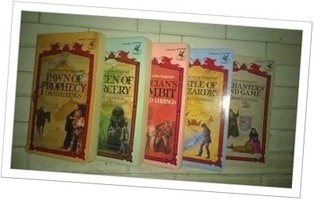The Belgariad by David Eddings
 September 20, 2015
by
Leslie Anderson
September 20, 2015
by
Leslie Anderson
The Pawn of Prophecy, the first book in David Edding’s famous Belgariad series, was the first character-driven fantasy book that resonated with me. I was a mere middle-schooler at the time and, aside from classics like The Hobbit and The Chronicles of Narnia, was new to the world of fantasy.
I’ll admit that the first hundred pages didn’t quite enthrall me. It was mostly about Garion, a boy, living a normal life on a farm. His companions were average, but his aunt, Polgara, and a wizened old visitor, Belgarath, were witty and engaging.
When they start to pull their party together, though, the book becomes a delight: spies, wizards, barbarians, and a trusty, simple blacksmith band together to chase a plot that is, honestly, secondary to watching how everyone interacts with each other, and the world at large.
Over the span of several books, they encounter countless bizarre places, unique and standalone characters, and peculiar side-quests, all the while bantering, teasing, becoming friends, and falling in love. There are side-characters who I’d love to see given whole books. There are locations, both creepy and surreal, where I longed to linger far longer than Eddings saw fit. He was probably correct, though. It’s always best to leave you wanting more.
And I definitely want more of the snake people, the weeping god, the animal-loving witch in the wilderness, the haunted hellscapes, and the other countless delights bursting the seams of these books.
In the initial series, some five books long, I’d argue that the first four books wander in their approach. This is normal for the epic-adventure, where characters often chase the plot across countless realms; the plot begins to feel distant, and the side-quests and one-off characters take the foreground until the end, when they can begin to tackle solving the plot.
Honestly, those first four books are my favorite. When they reach the point where they can complete their quest, my interest did not hold nearly so strong because the characters didn’t get to shine so much.
The only way this series could be better for me is if the plot and the troupe of loveable characters could be more entwined. Considering how large the troupe is, I can’t imagine how Eddings would pull this off, but regardless, this is a series I pull out ever 3-5 years and re-read, and every time it’s comforting and delightful, like a gathering of old friends I’ve been away from for far too long.
Articles that are part of the Character-Driven Fantasy Stories collection:


